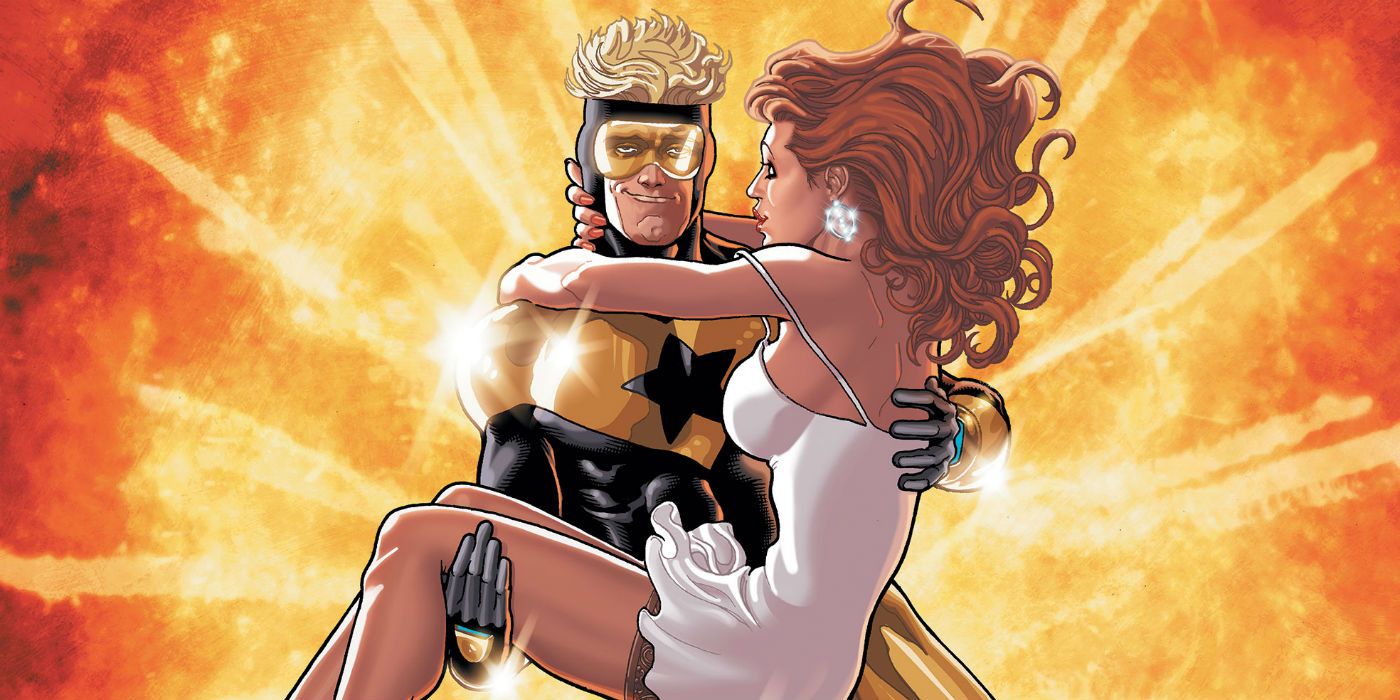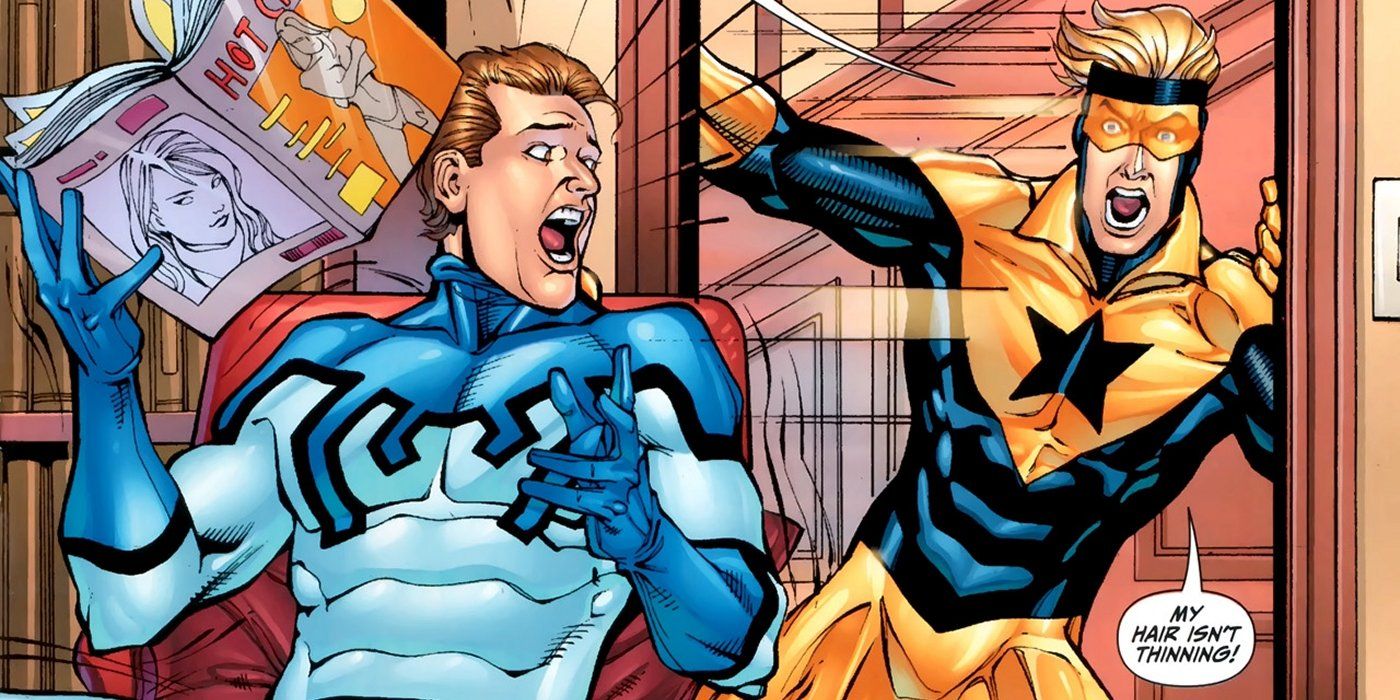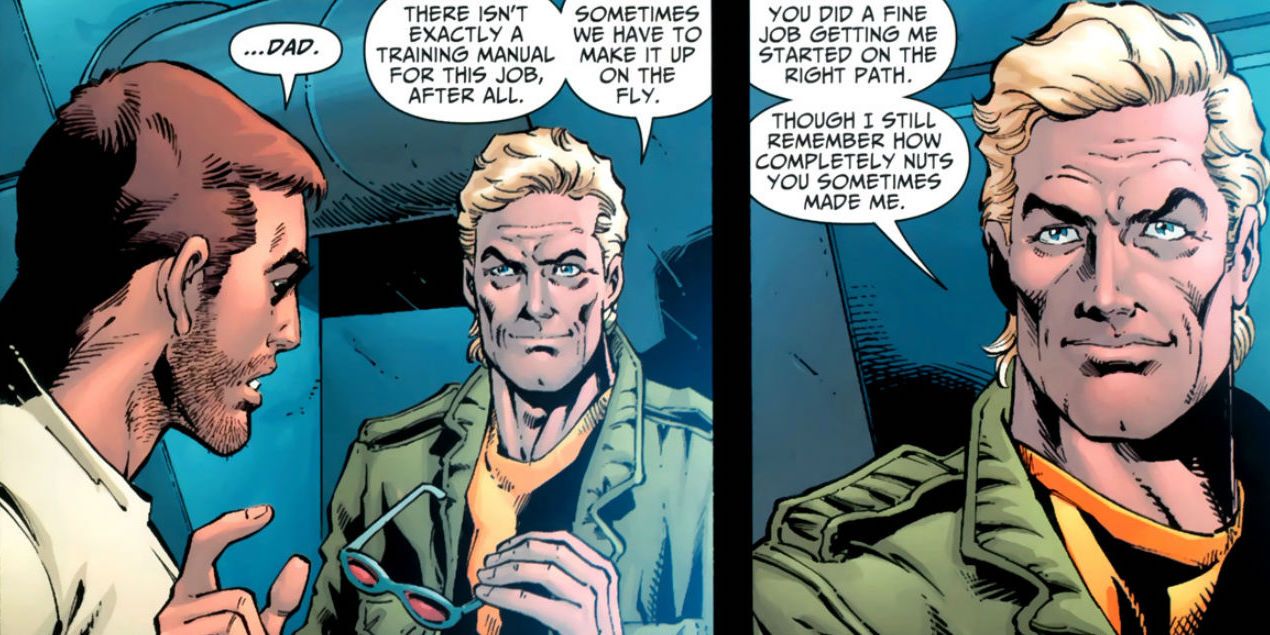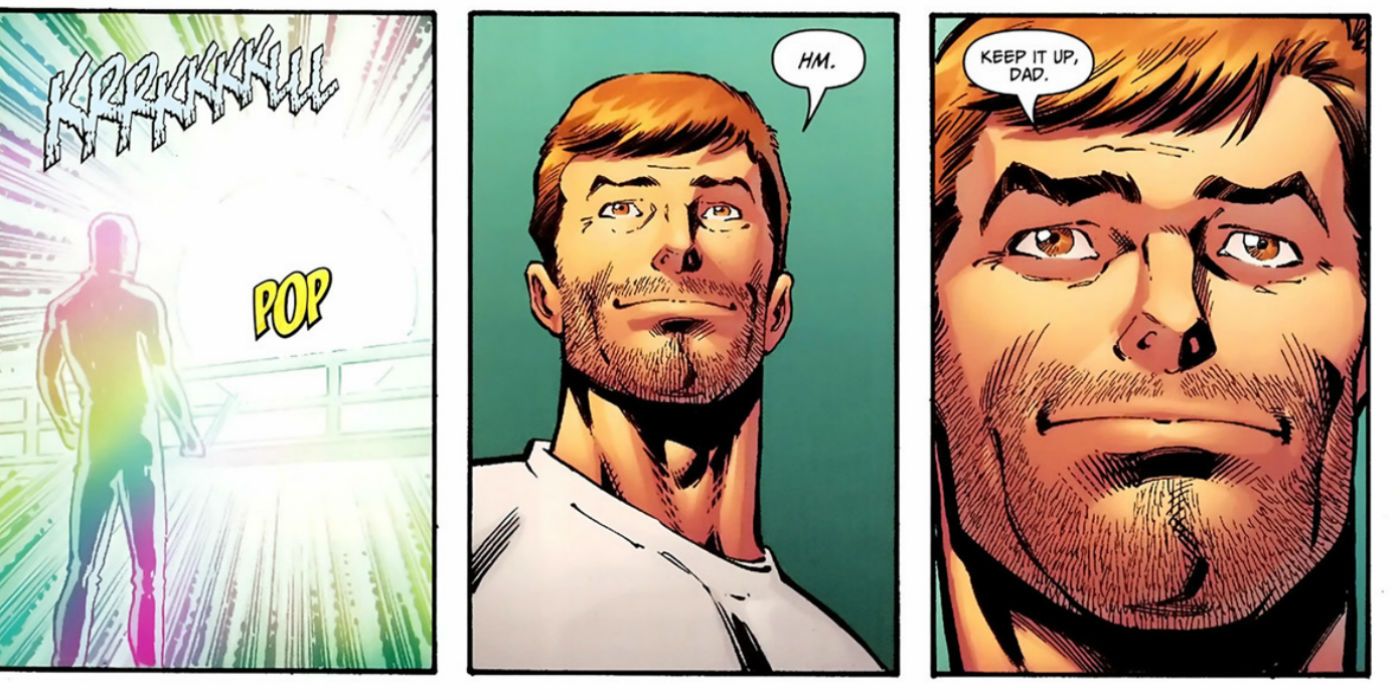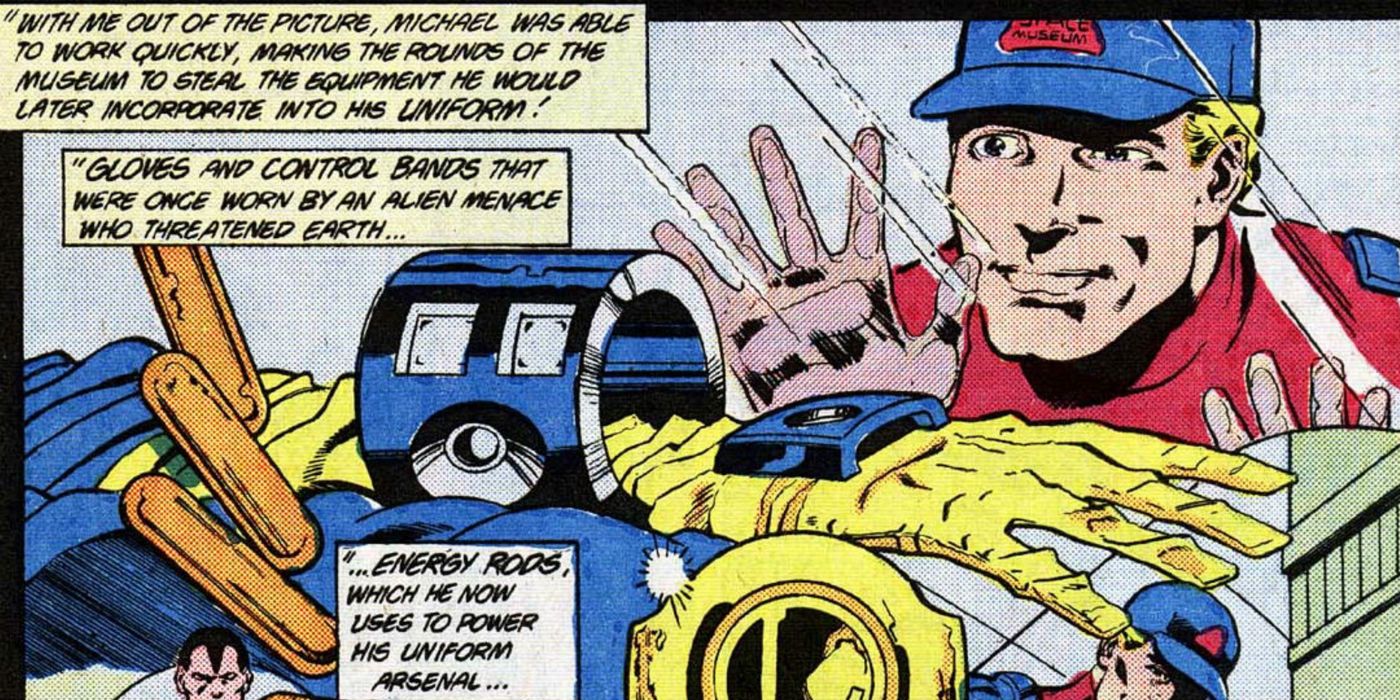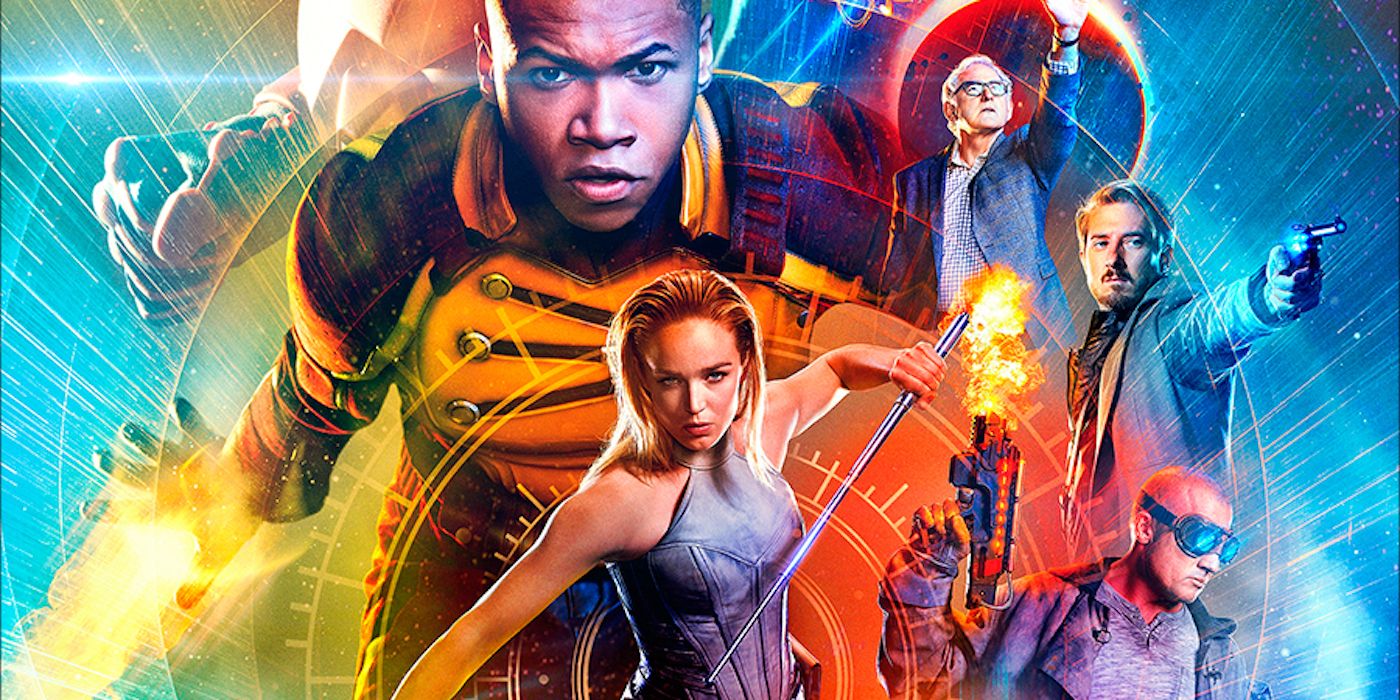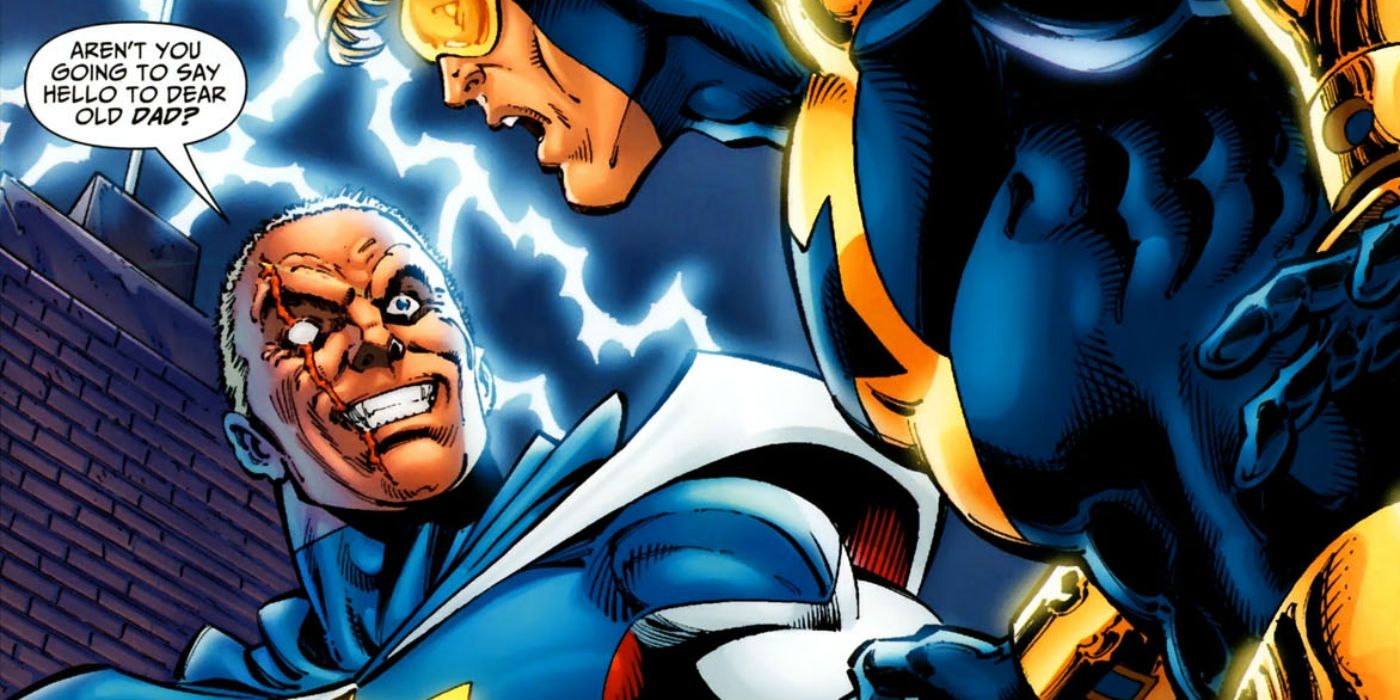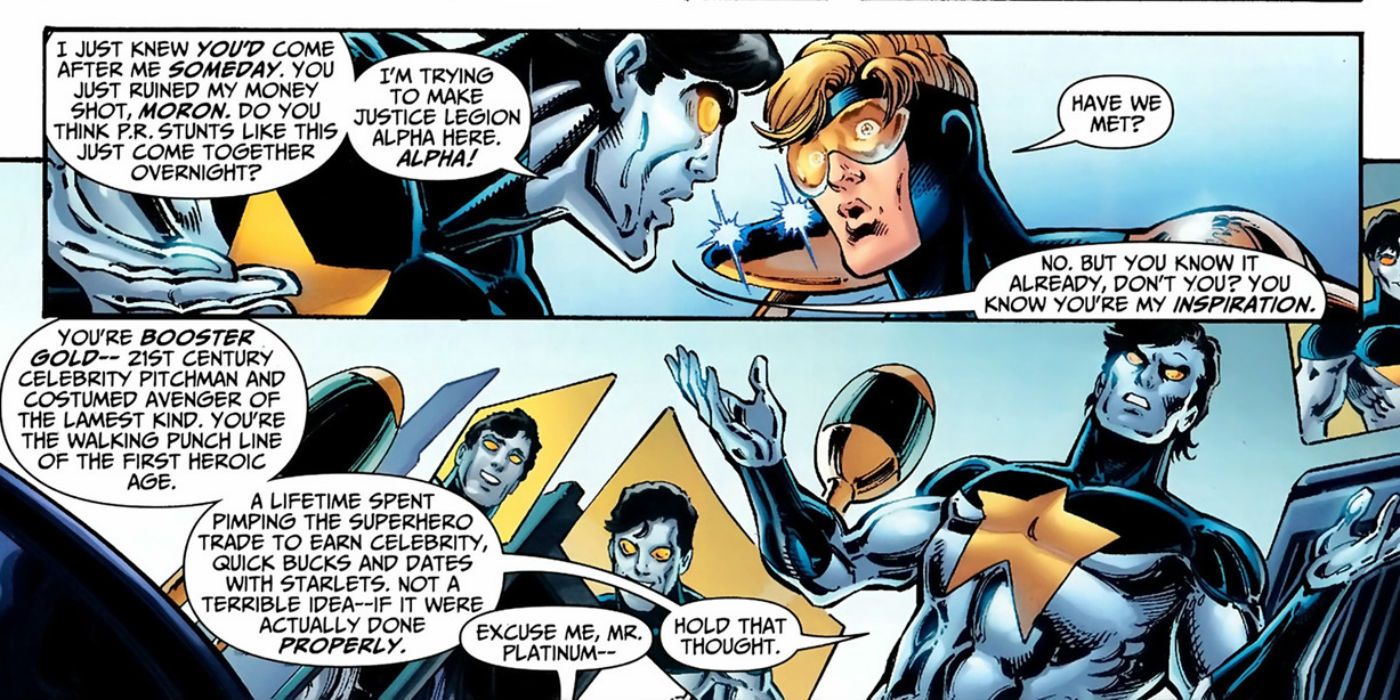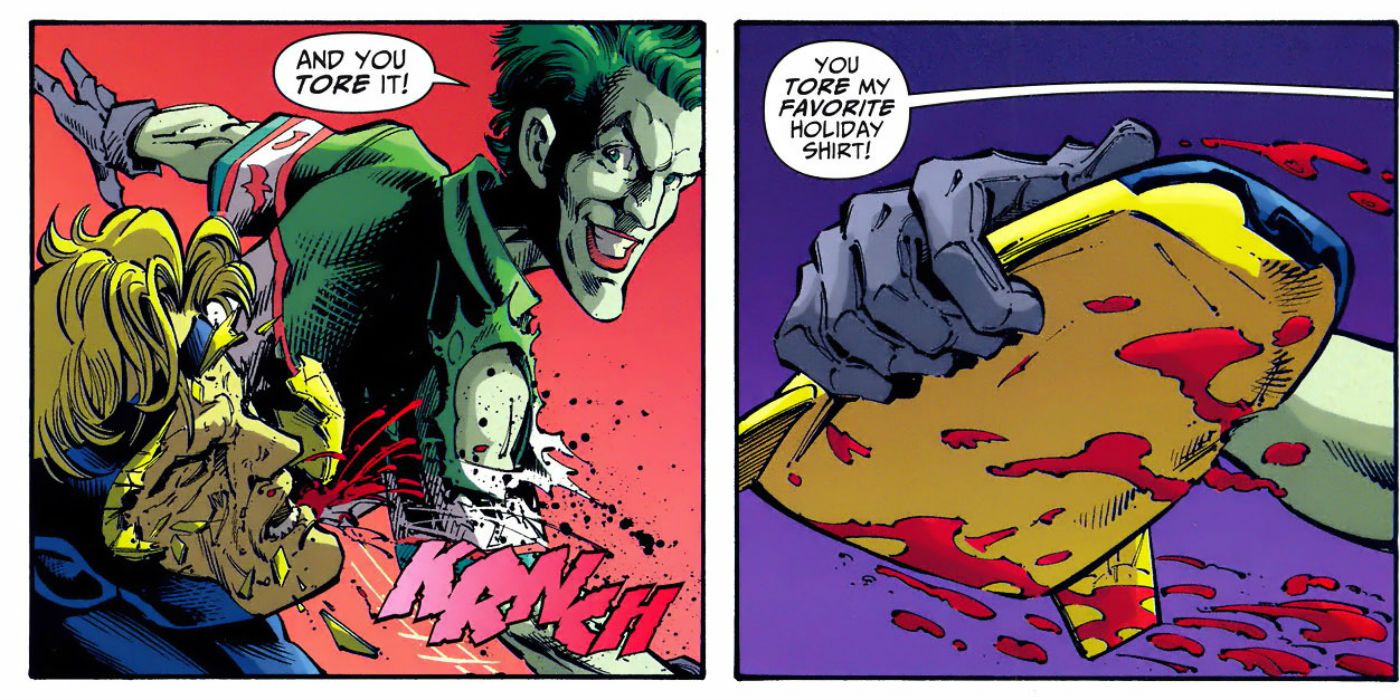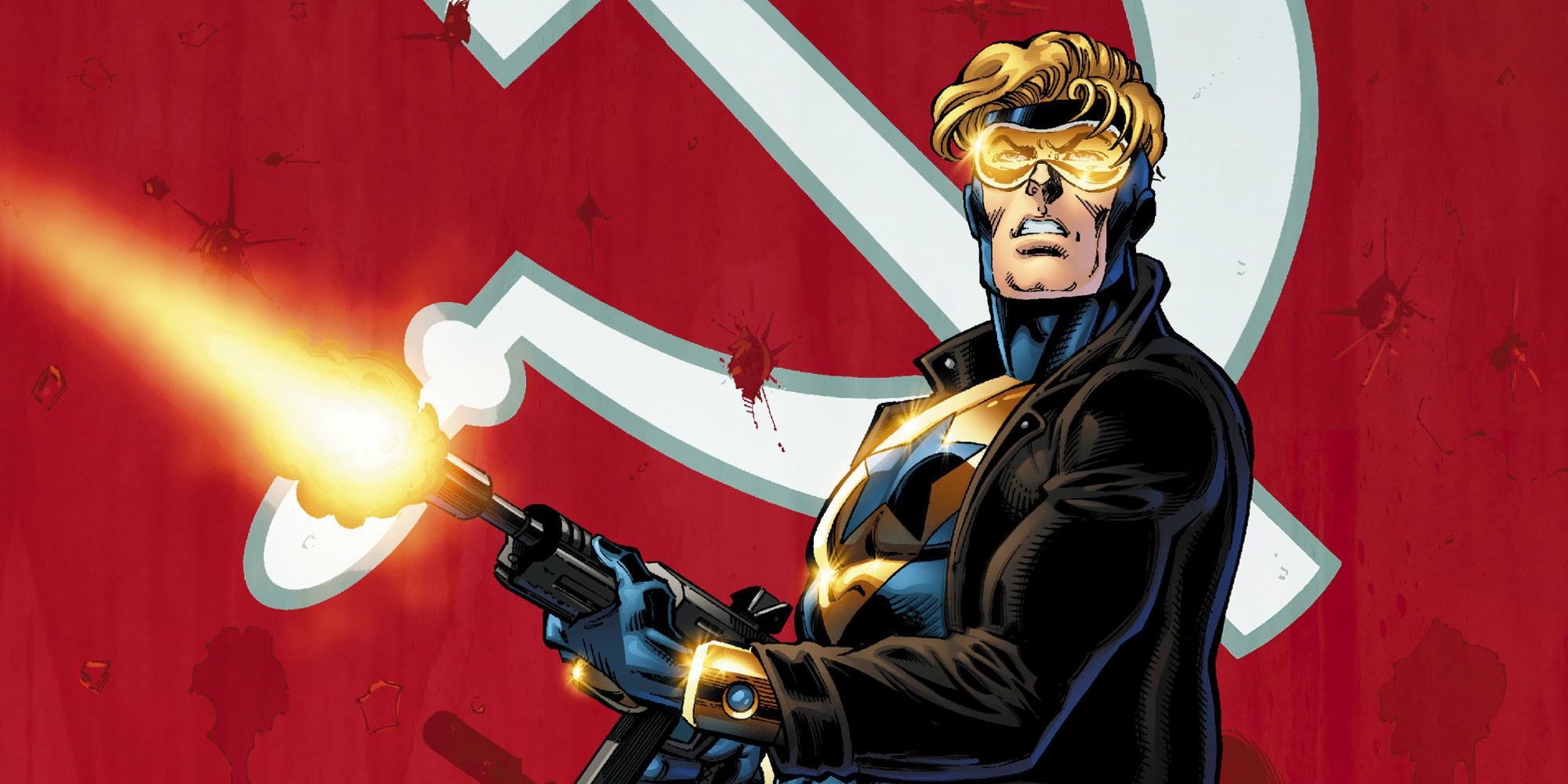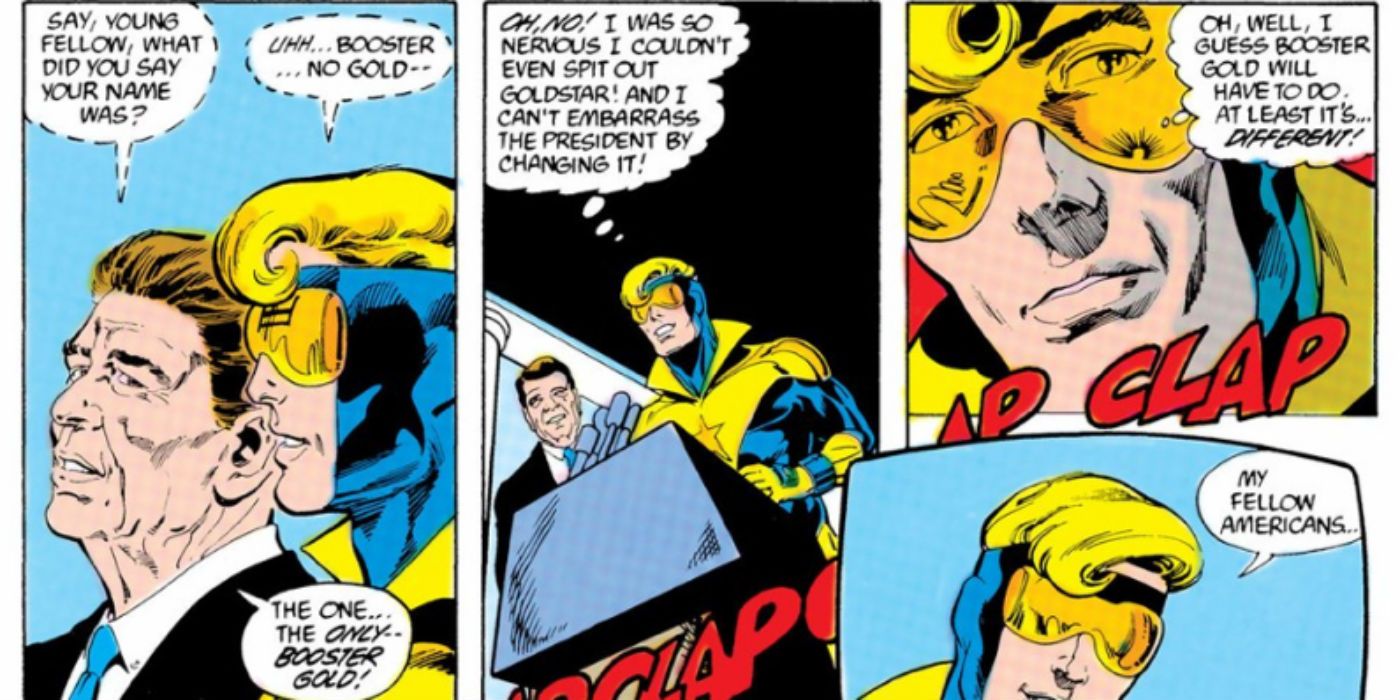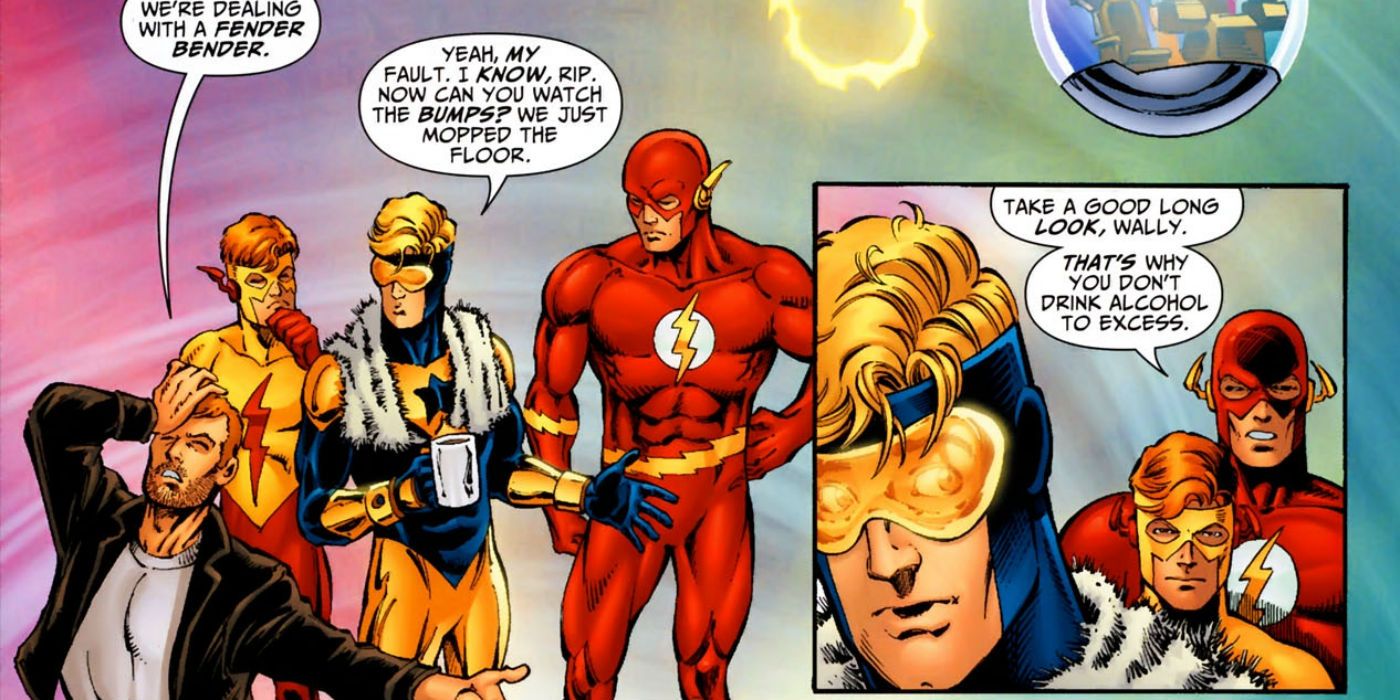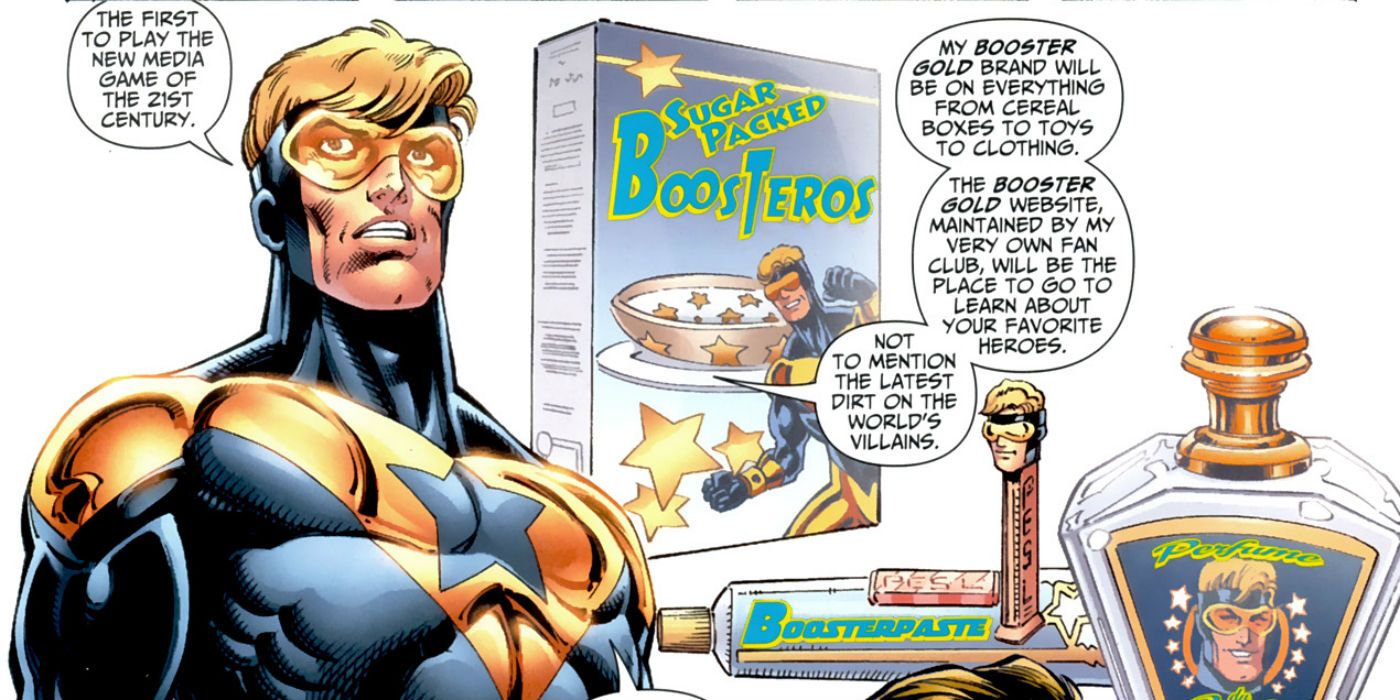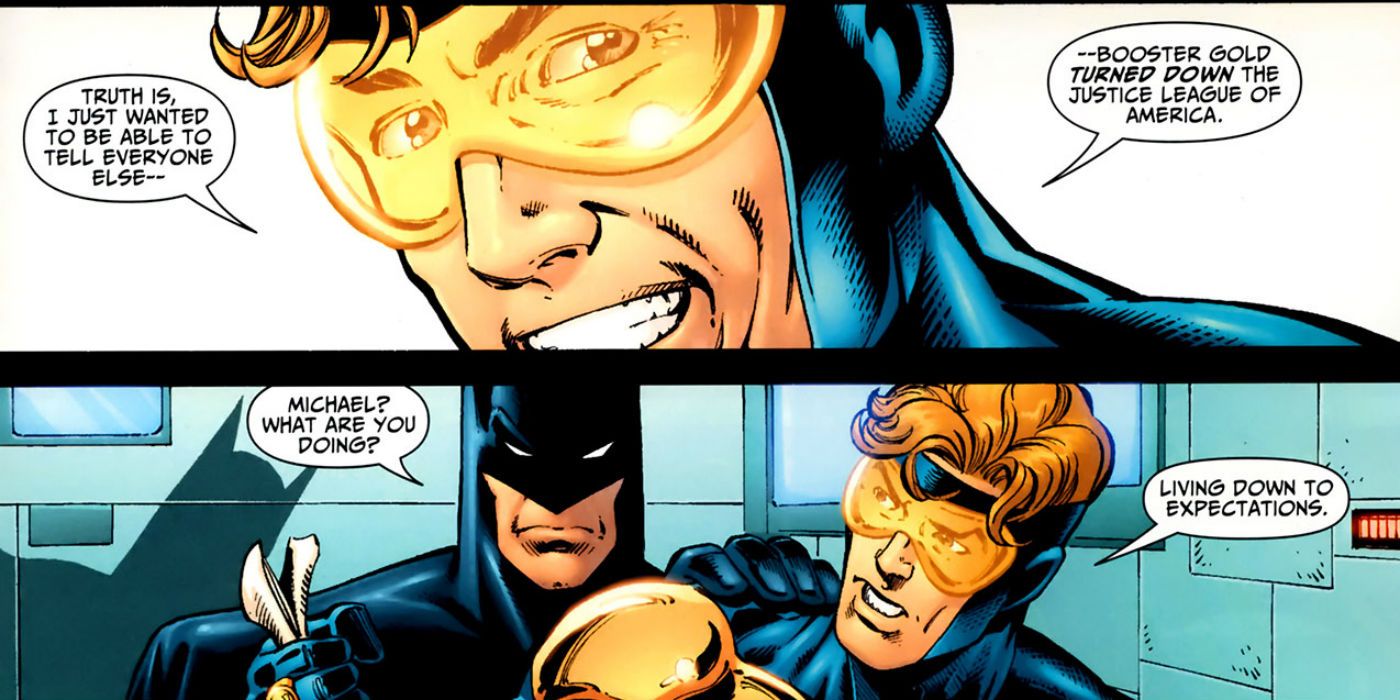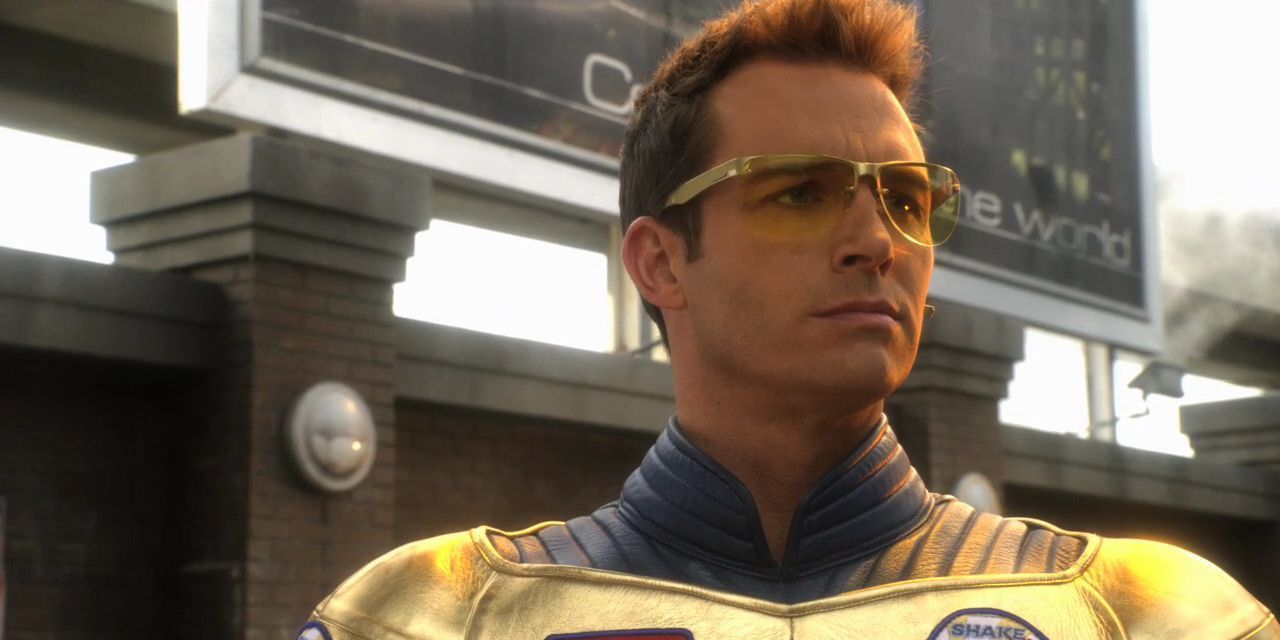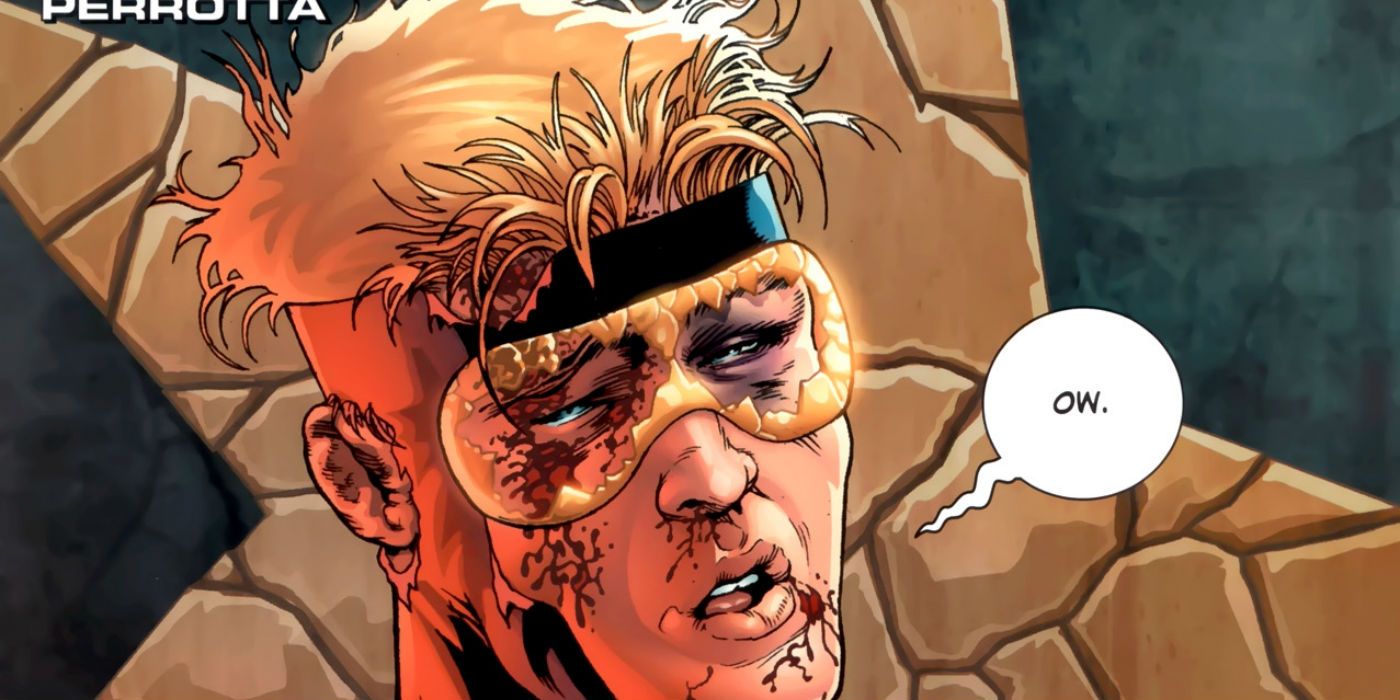Due to his time travel backstory, Booster Gold is "the greatest hero you never heard of." He is an obnoxious glory hound and he only becomes respectable, but not respected, over a long term character arc. He eventually learns no one from this time will ever know of his heroic feats, so he'll never win the respect he actually deserves.
On a meta level, the tag works too. In the vast oeuvre of DC's catalogue, Booster Gold doesn't exactly get much of the attention the holy trinity of Batman, Superman and Wonder Woman do. Looking at his 1950s retro-futurist costume and smarmy grin you'd think he was a tie-in ad to sell toothpaste.
Booster, with his George Costanza-like bumbling and lighthearted adventures, was less than a fit for the New 52, which saw even the warmest characters like Superman and Supergirl drift into needlessly dark territory. With Rebirth adding a more hopeful view of things, along with rumors of a Booster Gold movie being considered, now seems like a good time to explore the character in detail.
Here are 15 Things You Didn't Know About Booster Gold.
15. His Son is his Mentor
Part of the fun of time travel stories is the insanity of it all. An older Booster Gold assigns Rip Hunter to train his younger self to be a Time Master. However, the present day Booster--the one we follow day to day--is younger than Rip Hunter, has no idea Rip Hunter is actually his son or that his older self is involved in the shaping of his younger self. This creates a strange dynamic between the two, as the wise Rip has to try and now be a father-like figure to his own father. While this does more for Rip's character, it also provides an interesting twist on one of the primary themes of Booster's arc: fatherhood.
Booster's father was absentee. Booster was given a father figure in Rip Hunter. In turn this helped him become a father figure to Rani, a Daxam orphan, and eventually would lead him to become a good father to Rip Hunter. Parenthood is a cycle, after all; the father to the son and the son to the father.
14. He's From the 25th Century
Michael Jon Carter was the talented quarterback for Gotham University's football team. After a scandal, he lost everything and took a job as a security guard at the Metropolis Space Museum where he's surrounded by the history of superheroes and villains past. Whereas the typical hero's journey would have the protagonist immediately see the error of his ways and become a hero to make amends, Carter realizes how much easier it'd be to live in the past with the knowledge of history and technology available in his time. He steals a bunch of equipment and goes back in time to the 20th century, hoping to build a brand for himself and make a comfortable living.
While in "our time" he's considered a second-rate superhero, in his own time he's considered a major criminal. In stealing a time sphere, he's committed a capital crime and is seen as a villain comparable to Lex Luthor. Over the years, Booster has been pursued by Agent Broderick, a time-cop, looking to bring him in.
13. Booster's Served Time
There are two primary themes at play in Booster Gold stories. The first is fatherhood, and the second one--related to the first--is growing up. Booster has learned through tragedy and experience how to be both a better person and a better superhero. Learning accountability is an important lesson, and despite the good he's done, Booster would have to face the fact he still robbed a museum to get his equipment. Rather than Agent Broderick making the arrest--or Booster willingly turning himself in--Rip Hunter gives Booster up. Rip's reasoning for this is two-fold: finally get the authorities off their backs, and get Booster to understand consequences--something very important for people who constantly futz with time.
Booster's crime would have netted him a life sentence, but when shown the heroics Booster used the tech for, his sentence was reduced to five years (glossed over instantaneously thanks to time travel). The older Booster is slightly more grounded and focused, and has learned about consequences and that his good deeds have made a difference.
Also, he learns he's going bald and has a minor breakdown about it.
12. Booster Isn't in Legends of Tomorrow (Maybe)
In Legends of Tomorrow, Rip Hunter's backstory is substantially altered. The most noticeable--aside from the English accent--is that he seemingly has no connection to Booster Gold outside of a few aberrant personality traits. However, there is one throwaway reference: in the series, Rip Hunter's real name is revealed to be Michael.
The Warner Bros. mandate of keeping its film and television continuities separate has made it so there can be two versions of some characters (Superman and the Flash) but not others (Batman and Green Lantern). The rules for this are apparently arbitrary, and it may be that there will be two Booster Golds. In March, DC's Chief Creative Officer Geoff Johns teased at Booster Gold joining the cast in season 2, only to take back the comment, saying, "Perhaps Booster is being groomed for bigger things." In September, it was confirmed that a Booster Gold film was in development but that the possibility of him showing up in Legends still existed.
11. His Father Tried to Kill Him
The parents of superheroes usually fit into two categories: dead or evil. Booster's father, Jonar, isn't a good man. A petty thief and gambler, he walked out on his kids when they were four and showed back up when Jon was playing college ball. He manipulated his son's desire for a relationship to shave points and throw games to help pay off his debts. This ended with Jon expelled and Jonar in prison. The Time Stealers broke him out to use him as a body for Mister Mind and access to the Supernova power suit. Booster seeing his father again gave Mister Mind an added psychological advantage. In the end, they were able to free Jonar from Mister Mind.
Despite the heroics that found Booster and his team un-shattering time, an angry Jonar called his son a failure and would have exchanged his son's life for his own freedom. This profoundly affected Booster, only further underlined why he wanted to be a better man.
10. His Archenemy is Peter Platinum
If you want to be more technical, you could say his archenemy is Mister Mind, but there's definitely a case to be made for Peter Platinum. The best antagonists are a reflection of the protagonist, and that's what Platinum was written to be. He's a self-obsessed hero from the future who took much guidance from the life and reputation of Booster Gold--even his name is a reference, just upgraded because "Platinum always trumps gold." Platinum is what Booster would have become if he didn't have Skeets, Rip Hunter or Ted Kord around; he's what Booster would be if he hadn't learned from his mistakes. Booster was formed and re-formed by personal tragedies and deaths of close friends and allies. Without those darker elements informing on his world view, he'd be Peter Platinum--corrupt, arrogant and empty. When they finally fight, Booster is more vicious and angry than he normally is because he sees himself in Peter and can't help but want to knock some sense into him, as well as likely try and bury the shame he feels for having been so much like him.
Platinum made only one appearance, but the effect on Booster was as pronounced as the incident with his father--further proof of how far he had come.
9. The Joker Messed him up, Lots
In DC Comics, there's the theory of solid time; the past can be altered but not changed. Booster Gold wanted to change history by saving the life of Ted Kord. Rip Hunter couldn't get Booster to understand that it was meant to happen, so Rip decided it was time for another hard lesson. He claimed that Barbara Gordon was never meant to be crippled so Booster would have to stop the Joker the night she was attacked. Despite having every advantage, the Joker is still able to trounce Booster Gold. Attempt after attempt ends in Booster getting beaten, shot, burned and tortured, and Barbara Gordon still ends up crippled.
Booster’s guilt for being unable to save Ted Kord was understandable but all encompassing. It cut through to his center—what kind of hero is he if he can’t save his best friend? Rip’s lesson was about moving on, about accepting that success isn’t a guarantee, and that even superheroes fail sometimes.
This story came early on in Booster’s modern run (issue #5), and serves as a major step forward for the character. It showed a selflessness and emotional desperation that had been very rare for the character prior to Ted Kord’s death.
8. He was in the Suicide Squad
Despite his Justice League (and Superbuddies) membership, Booster Gold is one of the handful of heroes to have been in the Suicide Squad. However, this is Booster Gold, so it's a little complicated. During one of his quantum leaps time travel adventures ("1952 Pick-up"), Booster accidentally finds himself launched back in time and into an alternate reality. He teams up with Sgt. Rock and Task Force X, which would later become the Suicide Squad. In this original incarnation, Task Force X is comprised of secret agents and saboteurs. They're highly trained and not in any way villainous. Booster, rather, comes off closer to a member of the modern Suicide Squad--garishly colored and unable to follow orders. This one-off teaming was a great throwback to a practically lost era in Suicide Squad history--fighting the Cold War and not just superheroes--as well as mixing old and new continuities by adding in the Rocket Reds.
7. He got his Name from Ronald Reagan
As a football player, Michael Jon Carter's nickname was Booster. When he arrived in the 20th century he needed a code name. Something that reflected how he wanted to be viewed (as well as the material he cobbled together for a costume). He chose the name Goldstar. On one of his first missions, Goldstar saves President Ronald Reagan, who in turn wants to honor this new hero. At a major press conference, he's overcome by nerves--he's in front of the president, the press, and the entire viewing audience. Like any of us, he was freaked, and accidentally said "Booster," only to try and amend it by saying "Goldstar." The president misheard the muttering and introduced him as Booster Gold. Booster would of course go on to make an ass of himself on a regular basis, but in this minor scene, where he has stage fright and gets his own name wrong, we get a perfect example of Booster. The sense of failure, an overwhelming desire to just fit in, along with the hazard of always tripping over yourself.
6. He Drove Drunk and Nearly Killed The Flash
This one’s going to need some context. Booster traveled back in time to get Jonah Hex’s help to save Superman. To prove himself to Hex, Booster needed to drink with him. Short version: everything worked out, but Booster was wasted. In his hurry to catch Supernova, Booster took the helm of the time sphere and accidentally crashed into a past version of Flash and Kid Flash (Barry and Wally, respectively) who were in the middle of their own time travel adventure.
After the requisite corny Barry Allen speeches about swearing, safe driving and “the dangers of drinking alcohol to excess,” a Brave and the Bold style team-up begins, with the time-displaced Barry and Wally in complete Silver Age glory. Their dialogue is clunky, expository, and over-wrought. Wally is energetic and trying to sound more adult, and Barry is as boring as ever. It’s fun and innocent, and having Booster give his meta commentary on it is perfect.
5. He's the Post-Modern Superhero
Like Grant Morrison's Animal Man was a commentary on story and the effect a comic book character can have on an audience, Booster Gold was meant to be more than just a superhero story. Since Batman, Superman and Wonder Woman are situated on an altar of myth there isn’t a sense of modernity to them. At the time of his debut, the DCU had just restarted and they wanted to be innovative. Booster Gold was a satirical look at consumerism at the height of the Reagan 80s when our biggest exports were glam and image. His initial costume was overly flashy (Superman literally ripped his cape off and said “You can’t handle the cape”).
Booster and Ted Kord were represented by Maxwell Lord in the media, and helped score jobs for them: cutting ribbons at grand openings, commercials hocking Big Bell Burgers, and fan meet and greets. He charged everyone for the pleasure of Booster Gold, to the point of obtaining sponsors whose advertisements were pasted all over his costume like the jumpsuit of a NASCAR driver.
While there are plenty of characters that represent 1980s excess—Patrick Batman and Gordon Gekko rank high—Booster Gold is the true consumer. He bought into what they were selling.
4. He’ll be known as one of the Greatest Heroes of all Time…
As early as the original Dan Jurgens stories, it has been teased that Booster Gold had a special destiny. In more recent years, Rip Hunter dropped hints about the “Carter heroic legacy” (including his sister and several ancestors) and how Booster would eventually train his son who will become the greatest Time Master of them all. Of course, that was a hint dropped about Rip’s parentage, but it was lost on Booster.
In hints, jaunts and flash-forwards, Booster Gold comes to learn that through several trials and adventures, he will save the multiverse repeatedly. By the 31st century, his name will be as legendary as Superman’s. This news gives the downtrodden Booster something to strive for. Booster has always attempted to outrun his reputation, to prove that whatever was said about him before wasn’t indicative of the man he truly was or was meant to be. Finally, he sees that his hard work would pay off. He finally would get the glory, but that wasn’t even what he wanted anymore. He wanted respect.
But it would come at a price.
3. …but the Justice League will Hate him
To effectively move about under the radar, Booster couldn’t be taken seriously. He needed to be overlooked. The best way to do that was to isolate himself. Up until then Booster was working very hard at repairing his image. He dropped his sponsors (one of the sponsors was Vertigo Comics, if you look closely), tried to make amends with the Justice League in the hopes they’d bring him back into the group.
In a heartbreaking scene, the Justice League does decide to ring him back, but by then Booster knows he must keep a low profile—keep everyone thinking he’s a joke. So, he says he only did it so he could say to the press he turned down the offer. He then goes on a rant about being better than everyone and regresses to that selfish character they always thought he was. The Justice League leaves and Booster is inconsolable.
It’s one of the oddest sacrifices a character has ever had to make in comics, but it’s also one of the most understandable. In the future, he'll be a hero. In the present, everyone will go to their graves thinking he's a joke. They'll never know he had done the thing all great heroes do: he sacrificed himself.
2. He's one of the Most Realistic Superheroes
At the core of Booster Gold is his accessibility, a coming of age story that makes his bizarre origin easier to digest. Booster represents that gray zone between adolescence and adulthood. He’s like Alice Cooper’s “I’m Eighteen” song— “I’ve got a baby’s brain and an old man’s heart.”
Booster puts on airs, he tries too hard, he’s an ego maniac pretending to be confident to hide his feelings of uncertainty and doubt. Everyone has these moments that return to us years later and make us cringe; there are things in our past we want to change as we outgrow ourselves. In Booster’s case, it’s always so much more present. He’s a time traveler so the past is never far; he’s a superhero so every action is public and permanent.
When he devises his over-thought but still naïve plan to become a rich superhero, there’s this obvious connotation to the bright and big dreams of youth. You dream big until life forces you do dream smaller. Booster wanted fame and fortune, now he just wants to be happy.
1. He was the First Original Character to be Introduced After Crisis on Infinite Earths
Famed DC Comics editor Julie Schwartz used to say that every ten years or so you need to give continuity an enema. By 1985, DC Comics was gravely backed up. The universe had become too full and confusing. Crisis on Infinite Earths was a mess, but it got the job done in streamlining the DCU. To bring in a new character right after it ended was a shaky proposition. That he was so unconventional was another gamble.
Booster Gold was meant to be deeply flawed and reflective of many of our more negative traits as people. He was greedy, smug, and not nearly as clever as he thought. While he seemed to be a response to Reaganomics, he’s now—with barely changing a thing—a comment on celebrity culture and social media self-obsession. He’s managed to become what few fictional characters are: timely and timeless.
The irony is, Booster would not have been approved when he was without substantial backing by the company, and yet he’s very rarely been a high profile or integral character. Given the theme of failure that surrounds him, it’s strangely fitting.

